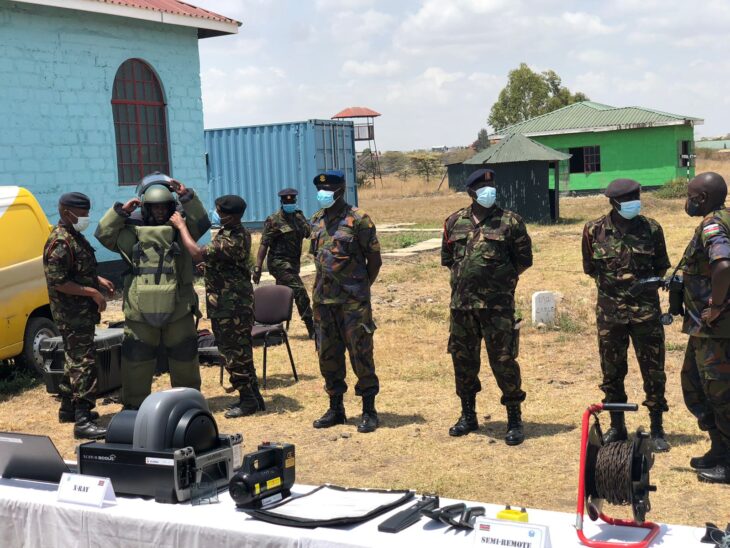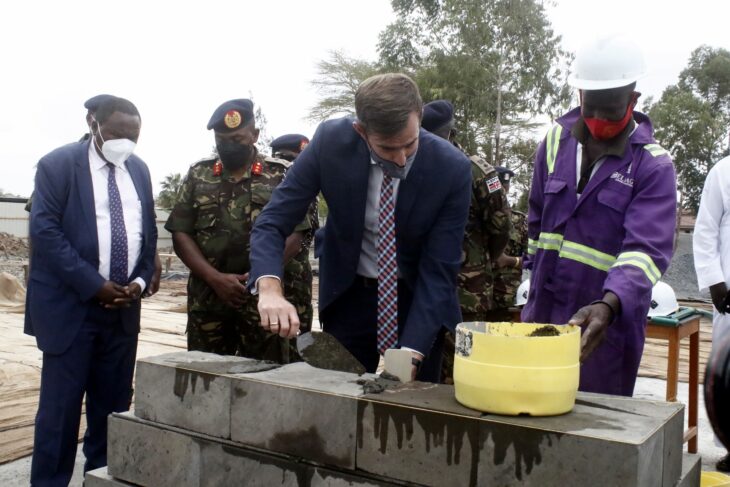NAIROBI, Kenya, Oct 5-With the war on terrorism becoming sophisticated every day, there is a growing need for the military and other security agencies to advance their knowledge and weaponry, in a bid to degrade the persistent threat.
For example, the Al-Shabaab terror group has lately devised a new way of staging attacks using Improvised Explosive Devices (IEDs)- making it more delicate for the forces engaging them both in Somalia and Kenya.
While in the past they would plant the IEDs on the roads, there have been cases of the terror group dropping the explosives using drones.
And with such, the Kenya Defence Forces and other security agencies in the country are set to benefit from a new counter-IED training facility, set to be developed at the Humanitarian Peace Support School (HPSS) in the International Peace and Security Training Centre (IPSTC).
This will be added advantage from the existing facilities, which were established through the support of the United Kingdom in 2016 and since then, 1,700 military and police personnel from 22 countries have been trained there.
The new wing will be constructed through the support of the German government, to a tune of Sh300 million.
With the new facility, the Kenyan forces will have more space for training and the ability to protect themselves as well as defeat IEDs and attack the networks building these devices…and subsequently, their contribution at the African Mission in Somalia (AMISOM) will be enhanced.
Shahidi News spoke to brigadier Joyce Sitienei, Director of the International Peace Support Training Centre, on the importance of the new wing and what it means to the war against terrorism.
“This is a very important programme that builds capacity for our personnel who have to face IEDs during operations,” she said.
“The counter-IED programme is very important because it is very a technical area that requires expertise to deal with highly explosive devices.”
On her part, Brigadier Ronnie Westerman, the UK Defence Attaché to Kenya hailed the partnership between Kenya and UK and more so on the counter-IED programme.
“We know that IED is the chosen weapon for the violent extremists, which has caused devastation among civilians, peace keepers, and security forces. We are committed to doing anything, to help develop capabilities (of the security agencies),” she said during an interview with Shahidi News.
She said with the training, the security agencies will “stay ahead” of terrorists, who keep on exploring new ways to cause more harm to civilians and troops fighting them.
Thomas Wimmer, the Germany Deputy Ambassador to Kenya said the new facility will be, “the newest chapter of the success story of IPSTC and HPSS. As most people know, countering IEDs is more than only a common education for people going on missions.”
He pointed out that IEDs, as proven in the past, are the main threat in asymmetric warfare all over the world.
Like in any other part of the world, police, and military in Africa experience the same.
“IEDs are killers. They do not only kill soldiers but also police officers and civilians,” he asserted.
Kenya has lost tens of security officers both in Somalia and Kenya. In the country, most IED attacks have occurred within the porous border between the two countries and parts of the coastal region, specifically Lamu.
With the new facility, Wimmer said forces deployed in United Nations and African Union mission will be better prepared.
“That is the reason why we are really happy and proud to sponsor this arrangement of 12 buildings here in Embakasi,” he said.
Four, of the 12 buildings will host a barbershop, a cafeteria with a kitchen, a well-equipped first aid facility, and a small supermarket.
“What that means is all participants can remain in the HPSS premises during their courses-with COVID-19 still around, it is surely a great idea,” he said.
–Partnership with the United Kingdom-
Kenya has also partnered with the United Kingdom to strengthen the Counter-IED capability of the Kenya Defence Forces.
“The Humanitarian Peace Support Schoop is a unique initiative on the African continent, providing a solid foundation on which to build a competent and capable regional center of excellence where police and military personnel across East and Southern Africa receive IED disposal training that helps to promote security and stability in Somalia,” Deputy British High Commissioner to Kenya Josephine Gauld said.
She noted that “the UK is a globally recognized expert in ED disposal and has a platform to assist regional partners to fulfil their AMISOM mandate by reducing the number of troops and casualties killed or injured by IEDs.”
She assured of the UK’s commitment to the programme, saying it is meant to promote long-term security and stability in the region as well as “just and strong institutions.”
“This is why the British Amry’s Defence Explosive Ordnance Disposal, Munitions and Search Training Centre support the wing with mentorship in capability development, management systems, and validation.”
She said the C-IED training at HPSS aims to transition from UK-led instructors to entirely those from East Africa.
Want to send us a story? Contact Shahidi News Tel: +254115512797 (Mobile & WhatsApp)



